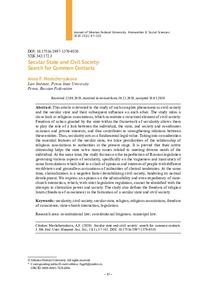Secular State and Civil Society: Search for Common Contacts
Скачать файл:
URI (для ссылок/цитирований):
https://elib.sfu-kras.ru/handle/2311/129908Автор:
Meshcheryakova, Anna F.
Мещерякова, А.Ф.
Дата:
2020-01Журнал:
Журнал Сибирского федерального университета. Гуманитарные науки. Journal of Siberian Federal University. Humanities & Social Sciences; 2020 13 (1)Аннотация:
This article is devoted to the study of such complex phenomena as civil society
and the secular state and their subsequent influence on each other. The study takes a
close look at religious associations, which constitute a structural element of civil society.
Freedom of action granted by the state within the framework of secularity allows them
to play the role of a link between the individual, the state, and society and coordinates
common and private interests, and thus contributes to strengthening relations between
these entities. Thus, secularity acts as a fundamental legal value. Taking into consideration
the essential features of the secular state, we trace peculiarities of the relationship of
religious associations to authorities at the present stage. It is proved that their active
citizenship helps the state solve many issues related to meeting diverse needs of the
individual. At the same time, the study focuses on the imperfection of Russian legislation
governing various aspects of secularity, specifically on the vagueness and inaccuracy of
some formulations which lead to a clash of opinions and interests of people with different
worldviews and groundless accusations of authorities of clerical tendencies. At the same
time, clericalization is a negative factor destabilizing civil society, hindering its normal
development. We express an opinion on the admissibility and even expediency of statechurch
interaction, which, with strict legislative regulation, cannot be identified with the
attempts to clericalize power and society. The study also defines the freedom of religion
limits (freedom of conscience) in the formation of a secular state and civil society Статья посвящена изучению таких сложных феноменов, как
гражданское общество и светское государство, их влиянию друг на друга. Важное
место отводится религиозным объединениям, которые являются структурным
элементом гражданского общества. Свобода действий, предоставленная
государством в рамках светскости, позволяет им играть роль связующего
звена между личностью, государством и обществом, а также согласовывать
общие и частные интересы, а значит, способствовать укреплению связей между
названными субъектами. Таким образом, светскость выступает в качестве одной
из фундаментальных правовых ценностей. На основе анализа существенных
признаков светского государства прослежены особенности взаимоотношений
религиозных объединений с властью на современном этапе. Доказывается,
что их активная гражданская позиция помогает государству решать многие
вопросы, касающиеся удовлетворения разнообразных потребностей личности.
Вместе с тем сделан акцент на несовершенство российского законодательства,
регламентирующего различные аспекты светскости, на размытость и неточность
некоторых формулировок, что приводит к столкновению мнений и интересов
людей, имеющих разные мировоззренческие установки, к беспочвенным
обвинениям власти в наличии клерикальных тенденций. При этом клерикализация
рассматривается как негативный фактор, дестабилизирующий гражданское
общество, мешающий его нормальному развитию. Обосновываются допустимости
и даже целесообразности государственно-церковного взаимодействия, которое
при строгой законодательной регламентации нельзя отождествлять с попытками
клерикализации власти и общества. Выявлены пределы свободы религии (свободы
совести) в условиях формирования светского государства и гражданского общества
Коллекции:
Метаданные:
Показать полную информациюСвязанные материалы
Показаны похожие ресурсы по названию, автору или тематике.
-
Registration of Religious Organizations: Legal Restrictions and Prospects of Development
Isaeva, Anastasia A.; Исаева, А.А. (Сибирский федеральный университет. Siberian Federal University., 2015-08)This article dwells upon some modern legal forms of activities of religious associations and problems of their registration. It is mainly focused on the issues of legal backgrounds in terms of freedom of conscience in ... -
Alternative Spirituality as a Phenomenon of Consumer Society
Grishaeva, Ekaterina I.; Kuznetsova, Olesya V.; Гришаева, Е.И.; Кузнецова, О.В. (Сибирский федеральный университет. Siberian Federal University., 2014-07)In this article discussed the possibility of applying the concept of consumer identity which is widely used in marketing research as an instrument to describe the behavior of the female practices followers. Female practices ... -
Concept and Structure of a Phenomenon of Spirituality in Modern Religious Studies
Kosolapov, Ruslan A.; Kuybar, Vladimir I.; Косолапов, Р.А.; Куйбарь, В.И. (Сибирский федеральный университет. Siberian Federal University., 2015-09)The social and philosophical understanding of the nature of spirituality which is considered as system of stable relations of the person and society, as a way of the organization and existence of the valuable beginning ... -
From a Neo-Patristic Legacy of Georges Florovsky to the Radical Theological Commitment in the Dialogue with Science
Nesteruk, Alexei V.; Нестерук, А.В. (Сибирский федеральный университет. Siberian Federal University., 2016-09)The article discusses the possible ways of the dialogue between science and theology in the context of modern atheism and secularism. It is argued that the dialogue cannot be symmetric and that the task of a theological ... -
Understanding the Secular in the Philosophical Tradition of the Vekhi Group
Shchipkov, Vasiliy A.; Щипков, В. А. (Сибирский федеральный университет. Siberian Federal University, 2023-11)The article analyzes the meaning of the category of the secular in the religious and philosophical collections of essays of the beginning of the twentieth century (“The Problems of Idealism”, “Vekhi (Landmarks)”, “From the ...

